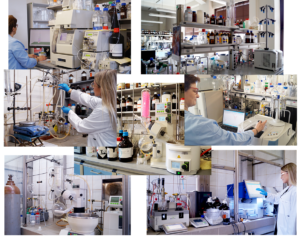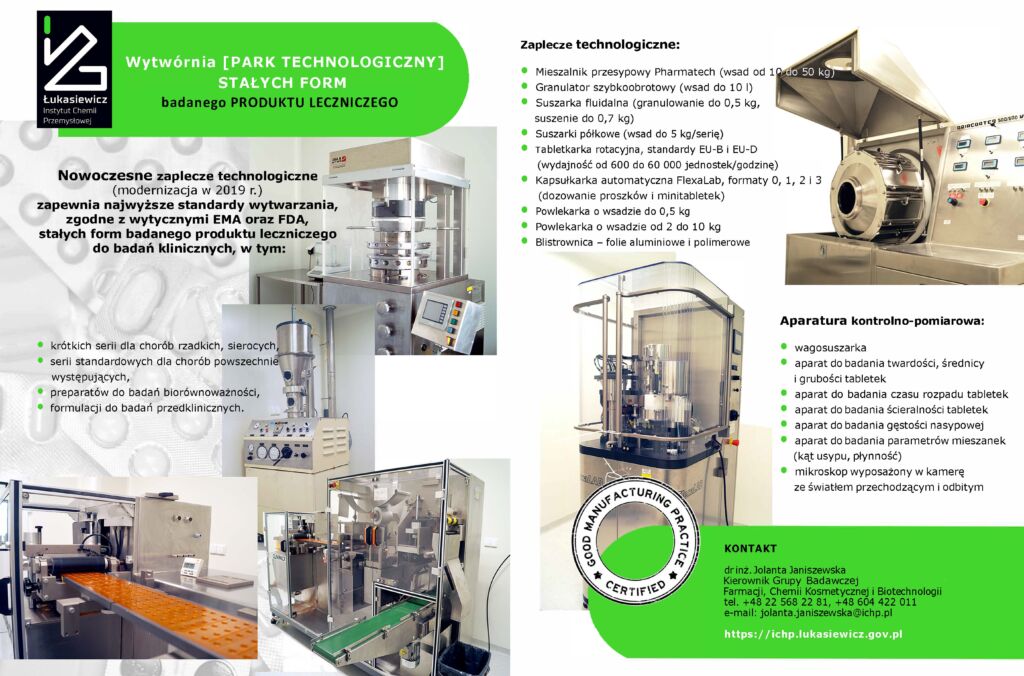Pharmacy and Biotechnology Center
Pharmacy, Cosmetic Chemistry and Biotechnology RESEARCH GROUP
Area Leader
Jolanta Janiszewska, PhD Sc. Eng.
phone +48 517 883 174
jolanta.janiszewska@ichp.lukasiewicz.gov.pl
The Formulation Technologies Section deals with the development of formulations and manufacturing technologies for medicinal products, medical devices, dietary supplements and foodstuffs for special medical purposes.
The team consists of specialists with many years of experience in conducting research and development projects, confirmed by numerous technology implementations at home and abroad.
State-of-the-art technology facilities (upgrade in 2019) ensure the highest manufacturing standards in line with EMA and FDA guidelines. The technology park enables the manufacture of solid forms of investigational medicinal products for clinical trials, including:
- Short series for rare, orphan diseases
- Standard batches for common diseases
- Formulations for bioequivalence studies
- Formulations for pre-clinical studies
Research topics
- Permanent forms:
- tablets, film-coated tablets, minitablets, granules (immediate-release and modified-release formulations, orally disintegrating tablets)
- Hard capsules
- Liquid and semi-liquid forms
- ointments, creams, gels,
- eye drops
Research and implementation offer
- Preliminary examination for patent purity
- Selection and evaluation of raw materials
- Development of technology for the manufacture of medicinal products and dietary supplements in the form of tablets, film-coated tablets, hard capsules.
- Direct compression, fluidised bed granulation, high-speed mixing at laboratory scale (up to 1-2 kg), large laboratory scale (up to 5 kg) and pilot scale
(up to 10 kg) - Technology tests, full range of IPC checks
- Modification and upgrading of formulations to reduce manufacturing costs and improve process efficiency, and solving process problems (bonding, perching, incorrect release profile, unstable formulation, etc.).
- Choice of packaging material
- Accelerated, intermediate and long-term stability tests
- Preparation of registration documentation
Technological facilities
- Pharmatech batch mixer (batch size 10 to 50 kg)
- High-speed granulator (input up to 10 l)
- Fluidised bed dryer (pelletising up to 0.5 kg, drying up to 0.7 kg)
- Shelf dryers (loading up to 5 kg/series)
- Rotary tableting machine, EU-B and EU-D standards (capacity from 600 to 60 000 units/hour)
- FlexaLab automatic capsule machine, formats 0, 1, 2 and 3
- dosing of powders
- dosage of mini-pills
- dosage of powders and mini-pills
- Coater with an input of up to 0.5 kg
- Coater with an input of 2 to 10 kg
- Blistering machine – aluminium and polymer films
Control and measuring equipment
- weight-dryer,
- apparatus for testing hardness, diameter and thickness of tablets,
- tablet disintegration time apparatus,
- tablet abrasion test apparatus,
- bulk density test apparatus,
- apparatus for testing mixture parameters (angle of repose, fluidity),
- microscope equipped with a transmitted and reflected light camera.
Contact
Joanna Lechnio, M. Sc.
phone + 48 453 056 146
joanna.lechnio@ichp.lukasiewicz.gov.pl
Two key areas of research are pursued in the Chemistry Section:
- development of innovative technologies for active substances of generic drugs on laboratory and large-scale non-GMP laboratory scale, allowing successive scaling up of processes of manufacturing pharmaceutical substances up to semi-technical scale,
- scientific research into the search for new compounds possessing biological activity in cooperation with leading academic centres at home and abroad.
The Chemistry Section has many years of experience in unit process optimisation in both the area of generic pharmaceutical substances and new API manufacturing technologies. We have gained this experience over many years by collaborating with or performing contract research for the country’s leading generic drug manufacturers. We also conduct polymorphism studies of known and new compounds, and optimisation of crystallisation processes. An expression of innovative solutions in original and generic drug research in implemented projects are numerous patent applications and patents granted, both domestic and foreign, as well as authorship of API implementations. The staff of the Chemistry Section are highly qualified personnel with practice gained during post-doctoral fellowships and internships abroad in world research centres and leading European pharmaceutical companies (USA, Czech Republic, Ireland). We have modernised instrumentation facilities allowing us to apply diverse synthetic techniques, optimise processes and critically analyse drug research results.

The Section has experience in preparing grant proposals independently and in consortia. Our knowledge and skills are used in the implementation of research in collaboration with academic and industrial partners, including multidisciplinary projects funded by national funds and European grants. The staff of the Chemistry Team are winners of innovation and invention competitions and authors of many publications in renowned journals.
Contact
Olga Michalak, PhD. Sc.
phone +48 453 056 175
olga.michalak@ichp.lukasiewicz.gov.pl
- Cosmetics and household chemicals
- Advanced functional materials – medical devices, food supplements, pharmaceuticals, nutraceuticals
- Use of bioprocesses in chemical technology
- Biologically active substances for the life science industry
- Biologically active peptides – protein hydrolysates, synthetic peptides
- Research and implementation achievements
Cloning of DNA fragments and construction of prokaryotic production strains
We offer primer development based on the supplied sequence of the desired DNA insert or biological material, amplification reactions of the desired DNA fragment, all necessary DNA purification steps and insertion into the expression vector.
Genetic constructs can be created based on commercially available vectors, as well as on proprietary prokary prokaryotic expression systems for industrial use.
Strain stability control, preparation and maintenance of Research Cell Bank (RCB) and Master Cell Bank (MCB) and Working Cell Bank (WCB)
Plasmid stability is assessed in terms of two parameters: the expression level of the recombinant protein produced and the ratio of antibiotic-resistant cells to cells in the total population (calculated generation time).
Plasmid stability testing is conducted in liquid culture in minimal medium with antibiotic (100% plasmid possession) and without antibiotic (no pressure to possess plasmid) for four consecutive 17-hour passages. From each culture appropriately prepared dilutions – are seeded into culture dishes with medium without antibiotic (grow cells with and without plasmid) and with antibiotic (grow only those with plasmid) – compare the number of colonies obtained – calculate cfu/ml. We assess the level of recombinant protein on SDS-PAGE.
Presentation of the result, e.g.: cfu/ml on medium without and with antibiotic, calculated generation time, SDS-PAGE gel. The persistence of expression of the produced recombinant protein in the tested strains confirmed for about 80 generations in cultures with antibiotic, as well as in cultures without antibiotic, is an essential requirement for accepting the strain for production.
Microbial culture / Upstream production
We offer the possibility to perform continuous, batch or batch culture with bacterial feed on a scale of 2-21 L (with particular emphasis on the culture of E.coli strain bacteria), which corresponds to the laboratory and quarter-technical scale.
We have many years of experience in developing, optimising and running cultures using bioreactors. The laboratories are equipped with the highest quality equipment to carry out the full production phase of the starting biological material for both research and implementation purposes (upstream production – inoculum preparation, production culture, biomass isolation, biomass disintegration and isolation of starting material for further production work).
The Section has 3 bioreactors from New Brunswick /Eppendorf:
- 1 X BioFlo 310 7.5L + additional vessel 7.5 L – autoclave sterilisation, working volume 2 – 5.5 L;
- 2 X BioFlo 415 14 L – SIP sterilisation, working volume 4 -10.5 L.
Cultures can be run to high optical densities of HCDC with full process control and separation into a culture and production fermentor. All bioreactors have validation documentation and are equipped with BioCommand Track and Trend and BioCommand Batch Control software for full monitoring of culture processes.
This allows parameter changes to be tracked, set values to be checked, alarm settings to be made and process-specific reports to be created for optimisation purposes and full documentation of breeding processes.
Purification of recombinant proteins / Downstream production
We offer the possibility of developing and performing laboratory and quarter-technical scale methods for the isolation and purification of proteins and peptides produced by production strains, taking into account the conditions necessary for transfer to an industrial scale. The service can be carried out using various chromatographic techniques: ion-exchange, hydrophobic, molecular sieving, affinity and others, carried out in low-, medium- and high-pressure environments (FPLC and HPLC) at room temperature or at refrigeration temperature.
The final product can be provided as a solution or lyophilisate of the desired or achievable purity.
The staff has many years of experience in developing, optimising and performing purification of recombinant proteins with pharmaceutical applications. The laboratory is equipped with the highest quality equipment to purify proteins in quantities suitable for laboratory work and to scale up the purification process.
OUR OFFER ALSO INCLUDES THE POSSIBILITY OF PERFORMING A COMPREHENSIVE BIOSYNTHESIS AND PURIFICATION SERVICE FOR RECOMBINANT PROTEINS ON A LABORATORY SCALE AND A QUARTER-TECHNICAL SCALE (UPSTREAM + DOWNSTREAM PRODUCTION).
Lyophilisation
We offer a lyophilisation service:
- solutions of biotechnology-derived products, e.g. proteins and peptides,
- bacterial solutions, blood plasma, vaccines, antibodies,
- solutions of compounds obtained by chemical synthesis,
- biological extracts,
- solid inorganic or plant-based materials,
- medicinal preparations in the research and development phase.
We also offer the possibility of developing a lyophilisation process for different products, optimising existing processes, as well as the possibility of developing a drug formulation for a lyophilised medicinal preparation.
Protein identification and molecular weight determination
We carry out isolation of proteins from the active substance, digestion medium and biological fluids using gel electrophoresis, high-performance liquid chromatography HPLC and fraction collector or UFLC. In addition, we perform purification and concentration of samples on RP-18/RP-4 type bed (e.g. ZipTip® C18, ZipTip® C4, PepClean™ C-18 Spin Column) or using U-Tube™ and other concentrators.
Isolated proteins in the form of solution or Coomassie Blue stained gel bands are subjected to identification, based on MS/MS analysis of peptides formed by proteolysis of the protein under investigation using a dedicated enzyme (e.g.: trypsin, Glu-C, Lys-C, Asp-N). The process is guided by searching protein sequence databases using MASCOT®. Before digestion, disulphide bridges in proteins are usually subjected to reduction and alkylation.
Molecular weight measurements are carried out using an Applied Biosystems mass spectrometer: 4800 Plus MALDI-TOF/TOF. Determinations are performed in the range 600 Da – 200 kDa with a measurement error of up to 1000 ppm in linear mode and 50 ppm in reflector mode. High-quality fragment spectra can be obtained, allowing identification of the substance being analysed.
Genetic engineering
- Sanger DNA sequencing (ABI Genetic Analyzer 3130)
- Genetic identification of microorganisms using the Microseq 16SrRNA system
- STR short tandem repeat polymorphism testing – paternity analysis
- Development of synthetic biological product pathways based on organismal systems biology analysis
Molecular modelling
- Molecular modelling of proteins and search for potential therapeutic (drugs) and prophylactic (vaccines) targets for selected organisms
- High-throughput searching of virtual databases to identify small-molecule compounds with biological properties
- Computational optimisation of small-molecule compounds for the development of new therapeutics
- Chemical and biological optimisation of selected hits
- Searching for and designing new antibiotics that circumvent existing resistance
Protein engineering
- Exploring antibacterial/antifungal alternatives targeted against selected pathogens
- Development of bioconjugate vaccines against selected pathogens
- Design of chemical product synthesis pathways in biological systems
- Development of enzymes with the required properties.
Other services
- MALDI TOF/TOF analysis of samples.
- Biobanking of bacterial strains.
- Optimisation of lyophilisation
- MTT toxicity tests on cell lines.
- Bacterial and yeast cultures in a bioreactor up to 10L working volume
- DNA sequencing
- Genotyping (species determination) of fungi and bacteria
- Establishing paternity – peace of mind
Contact
Jolanta Janiszewska, PhD. Sc. Eng.
phone +48 517 883 174
jolanta.janiszewska@ichp.lukasiewicz.gov.pl
